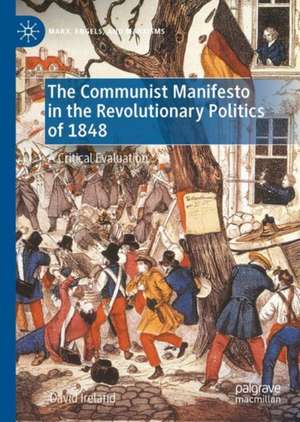The Communist Manifesto in the Revolutionary Politics of 1848: A Critical Evaluation: Marx, Engels, and Marxisms
Autor David Irelanden Limba Engleză Hardback – 9 aug 2022
| Toate formatele și edițiile | Preț | Express |
|---|---|---|
| Paperback (1) | 778.94 lei 6-8 săpt. | |
| Springer International Publishing – 10 aug 2023 | 778.94 lei 6-8 săpt. | |
| Hardback (1) | 691.13 lei 3-5 săpt. | +21.87 lei 6-12 zile |
| Springer International Publishing – 9 aug 2022 | 691.13 lei 3-5 săpt. | +21.87 lei 6-12 zile |
Din seria Marx, Engels, and Marxisms
-
 Preț: 357.01 lei
Preț: 357.01 lei - 20%
 Preț: 567.93 lei
Preț: 567.93 lei - 20%
 Preț: 692.66 lei
Preț: 692.66 lei -
 Preț: 199.14 lei
Preț: 199.14 lei -
 Preț: 215.80 lei
Preț: 215.80 lei - 20%
 Preț: 694.02 lei
Preț: 694.02 lei - 20%
 Preț: 754.07 lei
Preț: 754.07 lei - 20%
 Preț: 568.03 lei
Preț: 568.03 lei - 17%
 Preț: 429.12 lei
Preț: 429.12 lei - 15%
 Preț: 642.03 lei
Preț: 642.03 lei - 15%
 Preț: 584.43 lei
Preț: 584.43 lei - 18%
 Preț: 889.92 lei
Preț: 889.92 lei - 15%
 Preț: 694.69 lei
Preț: 694.69 lei - 18%
 Preț: 787.29 lei
Preț: 787.29 lei - 18%
 Preț: 784.13 lei
Preț: 784.13 lei - 15%
 Preț: 579.02 lei
Preț: 579.02 lei - 18%
 Preț: 730.47 lei
Preț: 730.47 lei -
 Preț: 383.93 lei
Preț: 383.93 lei - 18%
 Preț: 785.42 lei
Preț: 785.42 lei - 15%
 Preț: 579.02 lei
Preț: 579.02 lei - 15%
 Preț: 581.33 lei
Preț: 581.33 lei - 18%
 Preț: 782.57 lei
Preț: 782.57 lei - 15%
 Preț: 645.79 lei
Preț: 645.79 lei - 18%
 Preț: 940.25 lei
Preț: 940.25 lei - 18%
 Preț: 896.39 lei
Preț: 896.39 lei - 15%
 Preț: 586.05 lei
Preț: 586.05 lei - 18%
 Preț: 781.94 lei
Preț: 781.94 lei - 15%
 Preț: 582.80 lei
Preț: 582.80 lei -
 Preț: 327.71 lei
Preț: 327.71 lei - 15%
 Preț: 493.89 lei
Preț: 493.89 lei - 15%
 Preț: 501.55 lei
Preț: 501.55 lei -
 Preț: 213.20 lei
Preț: 213.20 lei - 18%
 Preț: 783.50 lei
Preț: 783.50 lei - 15%
 Preț: 471.53 lei
Preț: 471.53 lei - 15%
 Preț: 496.80 lei
Preț: 496.80 lei - 18%
 Preț: 893.05 lei
Preț: 893.05 lei - 18%
 Preț: 895.58 lei
Preț: 895.58 lei -
 Preț: 450.49 lei
Preț: 450.49 lei - 15%
 Preț: 579.52 lei
Preț: 579.52 lei
Preț: 691.13 lei
Preț vechi: 863.91 lei
-20% Nou
Puncte Express: 1037
Preț estimativ în valută:
132.25€ • 137.81$ • 109.50£
132.25€ • 137.81$ • 109.50£
Carte disponibilă
Livrare economică 13-27 martie
Livrare express 26 februarie-04 martie pentru 31.86 lei
Preluare comenzi: 021 569.72.76
Specificații
ISBN-13: 9783030994631
ISBN-10: 3030994635
Pagini: 278
Ilustrații: XIII, 278 p.
Dimensiuni: 148 x 210 x 26 mm
Greutate: 0.5 kg
Ediția:1st ed. 2022
Editura: Springer International Publishing
Colecția Palgrave Macmillan
Seria Marx, Engels, and Marxisms
Locul publicării:Cham, Switzerland
ISBN-10: 3030994635
Pagini: 278
Ilustrații: XIII, 278 p.
Dimensiuni: 148 x 210 x 26 mm
Greutate: 0.5 kg
Ediția:1st ed. 2022
Editura: Springer International Publishing
Colecția Palgrave Macmillan
Seria Marx, Engels, and Marxisms
Locul publicării:Cham, Switzerland
Cuprins
1. Manifesto Style and Communism Substance.- 2. Solo Marx, the NRZ as Emerging 1848–49 Focus.- 3. Actual Measures and Missing Levers. 4. Revolutionary Roles: Classes and ‘Countries’.- 5. Lingering in Paris, Brussels Preludes.- 6. Engaging with Workers: Mainz, the Communist League, Stephan Born, and the CWA.- 7. Conclusions: Targeting and Priorities.
Recenzii
“The Communist Manifesto in the Revolutionary Politics of 1848 provides the latest scholarly study of one of the most familiar political pamphlets from the nineteenth century ... . Ireland’s investigative approach sheds valuable light on the background context of the Manifesto and its immediate political aftermath. ... the book succeeds in challenging readers to consider unsettling questions about the Manifesto. ... Ireland stays true to his promise of sticking to the historical record.” (Igor Shoikhedbrod, History of Political Thought, Vol. 44 (3), 2023)
Notă biografică
David Ireland is an independent historian based in London, UK. He studied German and French at Keble College, Oxford, and more recently did an MA in Political Thought and Intellectual History at UCL/Queen Mary University of London
Textul de pe ultima copertă
This book examines why, on the eve of the pamphlet’s 175th anniversary, the Communist Manifesto left so faint an imprint on Europe’s most revolutionary year of 1848, when it has had such a huge impact on posterity. The Manifesto that year misread bourgeois intentions, put too much faith in the industrial proletariat, too little in peasants, too much emphasis on the German states, and none on England. Marx and Engels preferred in 1848–9 to focus on the middle-class Neue Rheinische Zeitung, declining to galvanise working-class groups whose leadership they had actively sought. They neglected to return swiftly to the German states in their crucial 1848 ‘March days’. The Manifesto’s programme barely overlapped with contemporary campaigners or comparative pamphleteers, or the replacement Demands of the Communist Party in Germany. The book considers the consequences of Marx opting to write the Manifesto alone in January 1848. It also questions the source and significance of the pamphlet’s most memorialised phrase, ‘the spectre of Communism’, whether it was written for the ‘working men of all countries’ addressed in its finale, and whether Marx and Engels regarded the Manifesto as highly in 1848, as they undoubtedly did in later life.
David Ireland is an independent historian based in London, UK. He studied German and French at Keble College, Oxford, and more recently did an MA in Political Thought and Intellectual History at UCL/Queen Mary University of London
Caracteristici
Considers the impact of Karl Marx’s Communist Manifesto on the Revolutions of 1848 in Europe Addresses the flawed targeting of Marx’s Communist Manifesto in comparison to other pamphlets released at the time Describes distractions faced by Marx and Engels in 1847–8 that may have weakened their approach to the Manifesto
